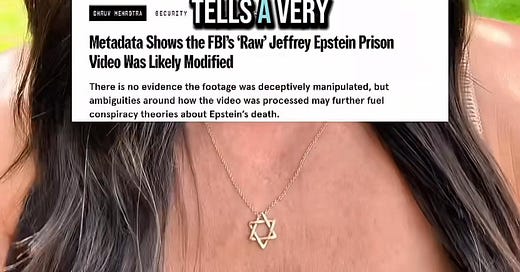This is not a conspiracy theory.
It’s a chain-of-custody problem.
And if you’ve ever stepped foot in a courtroom, you know how serious that is.
Last week, the Department of Justice released what they called the “raw surveillance footage” from the night Jeffrey Epstein died in federal custody.
But almost immediately, digital forensic experts and journalists noticed something strange.
The metadata—the hidden technical fingerprints embedded in every file—revealed the video had been edited. Specifically:
It was exported from Adobe Premiere Pro
It was stitched together from at least two separate video files
It was saved multiple times before being released
And, it skips an entire one-minute segment between 11:58:58 PM and 12:00:00 AM
All of that, and they still decided to release it and call it “raw” footage.
This is what makes it legally indefensible:
If I tried to introduce a video like this in a courtroom, as a public defender?
It would be thrown out. Immediately.
Because we have standards for what qualifies as evidence:
The original file must be preserved
The chain of custody must be intact
And any alterations—whether technical or cosmetic—must be disclosed and explained
None of that happened here.
So why does this matter?
Because the DOJ didn’t just release a video.
They made a claim: that this was untouched, unaltered, and could be trusted.
But the evidence proves otherwise. And that raises serious questions—not just about what’s on the footage, but about how federal agencies handle transparency in cases that demand public accountability.
This isn’t about feeding conspiracy theories.
It’s about refusing to accept performative transparency in place of the real thing.
They thought we wouldn’t look.
They thought we wouldn’t understand.
They thought we’d move on.
We can’t afford to.
If you found this important, share it. Forward it. And if you’re not yet subscribed, please do.
If you’re able to become a paid subscriber, it helps me keep covering the stories the powerful would rather ignore. Thanks for being here.
In solidarity,
Eliza













Share this post